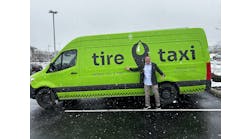Before you roll your eyes or think TL;DR (too long; didn’t read) please bear with me. This is a big problem in the tire and automotive industry as far as small business is concerned. It’s worth not only the 10 minutes to read, but the time it takes to make sure your business is properly planned out. So let’s get right to it:
Are you an S corp or C corp? If when you started the business or inherited it and didn’t pay much attention to these things, you are likely a C corp. C corps have been in the news lately because Congress’ recent action lowered large corporations’ taxable rate from 35% to 21%, “permanently” – and that’s in quotes because Congress can change it in the future if they want to or when power shifts from one party to the other. This seems desirable, and it is, if say you are a large company. In a C corp, the profits made are taxed at the lower rate (21%) vs. your personal income tax rate you personally pay Uncle Sam every year.
However, in a small company, if you made less than $50,000 in profit last year as a C corp your rate is about to go up, and you will also be taxed again when you or the government decide to take a distribution from the company’s profits. See, for a C corp, there is a clause that allows the government to force profit distribution called dividends. This will hit the person at the personal income tax rate. That’s called C corp double taxation. See, for large companies, that’s not an issue because the company’s profits are not a piggy bank for the owners. Large companies that make hundreds of thousands of dollars in profits also have shelters in the tax code to protect their profits as a C corp.
You will also pay this double tax when you sell the business. Ouch. In a small company, dividends are often used to help pay for unexpected expenses, the need to care for elderly parents, a sick child, etc.
Also, remember that if you just file the minimum paperwork to start a business, the government automatically makes you a C corp. That should tell you right there that C corps pay more taxes in the long run since the government is dependent on collecting as much tax as possible. Oh, and if your land is not in a separate company, you’ll likely pay another 15% on any rent you charge yourself. Good grief. Get your land out of your primary company ASAP. It’s not only potentially costing you money, but if a lawsuit ever arises from an accident or tragedy, you could lose the land in a judgement. If it’s in a separate company, it’s unlikely to be exposed to a lawsuit against the tire and service company.S corps are pass-through taxable entities. That means whatever profit the company makes, the owner pays tax on that profit every year on their own personal tax documents. You must take extra steps at the beginning to become an S corp, but it’s not complicated. Once you pay your taxes on S corp profit you’re done paying. There is also a special 20% tax deduction for S corps. Over large periods of time, taxes always rise, so in all likely hood, it is better to pay taxes now rather than later if in fact you are a small business. A person reading this article that has 10+ stores may want the benefits of C corp.
Now, as an S corp, it should be mentioned that you need to pay yourself a decent salary through the business, it can’t be all distribution, otherwise the government will hit you for additional taxes, but again, this can be managed easily with a competent tax accountant.
OK, maybe I convinced you to change and you talked to your accountant and they resisted, saying no, it’s better to stay. Wrong. It’s easier for them if you stay. Also, you know how every profitable year you are scrambling to get your company’s earnings down and spending money on things in December? Well, as an S corp, that would largely come to an end unless you had an absolutely banner year. The mad scramble can also happen if you don’t amortize and depreciate properly, but that’s another column.
Bottom line: If you are a big company with a CEO, CFO, a board and have departments of HR staff and accounting, and your profits are in the high hundreds of thousands of dollars a year – it’s likely you should be a C corp. If you are a single store operation or own a handful of stores, you really need to dig deep into your numbers, pay for a consultation with a tax attorney or accountant, and in all likelihood strong arm your current accountant into setting you up as an S corp. In the long run, a small business is much, much, much better off as an S corp. ■
Dennis McCarron is executive director of Dealer Strategic Planning Inc., a company that manages multiple tire dealer 20 Groups in the U.S. (www.dsp-20group.com). To contact McCarron, email him at [email protected].


